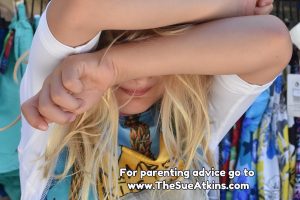


Like it? Share it!

We all lose the plot at times & lose our temper & end up shouting at our kids, but what is the difference between the odd shout & consistent verbal abuse?
Shouting or constantly yelling at your children might strike you as a natural and an effective form of discipline if you were brought up with it, because that’s what you are used to, but for children it can cause emotional trauma that can result in long-lasting harm.
Among the many damaging effects yelling and shouting at children can cause, particularly if it is consistent verbal abuse, is that it can seriously undermine your child’s self-esteem & self-confidence & damage their ability to trust people and their ability to be able to form appropriate relationships with others. It can also chip away at their academic and social skills. In fact, current research shows that children who are verbally abused can be just as damaged emotionally as physically and sexually abused children which places them in as much risk for depression and anxiety too.
I think we all know the difference between a short-tempered response but if you find yourself doing any of these things consistently then you may be verbally abusing your child:
Yes. Research shows that abused children are more likely to:
Here is my comprehensive article on ‘How to Handle Anger Positively.’ https://sueatkinsparentingcoach.com/2011/03/how-to-handle-anger-positively/
Everyone gets angry with their kids at some time or another – it’s normal – it’s healthy. Kids know just what buttons to push and they push them! It helps to accept that anger is an honest emotion, but it’s what you choose to do with your anger that’s important.
Don’t be afraid to let your anger take its natural course because if you suppress your anger, it can lead to frustration, resentment, bitterness, a sense of hopelessness and depression which is not a good thing for you or your children long term.
One way is to press an imaginary internal ‘pause button’ (like your remote control) and ask yourself ‘What exactly am I annoyed or angry about?’ This helps you step back from the situation – getting you back in control and helping to calm yourself down. Really imagine the DVD player in your hand as it’s a great way to remember to get back in control.
You will probably discover that you get wound up by the same things over and over again. So start to keep an anger diary so you start to notice your anger triggers. Is it just when you are hungry and tired and running on empty just before dinner? Is it when you go into your daughter’s bedroom for the ninth time to tell her to turn the music down?
What physical signs do you get to warn you that you are about to “lose it”? Do you start to breathe faster, go red, feel like a volcano is about to erupt as it rises up your body from your tummy? By starting to notice your physical signs you are again getting back in control and stepping back from the situation which is much better. You are becoming aware of your triggers.
Ask yourself a more empowering and useful question: ‘What would I like to see happen in a perfect world?’ as this helps you start focusing on a new solution to your frustration. Relax and start to breathe slowly and deeply – this takes the edge out of the anger. You need to focus very specifically on what it is you want to see happen. This gives you clarity and direction and helps you pass this on to your children who often don’t understand what exactly it is you want them to do.
Click here for more of my practical tips.
Firstly, just be aware that you do it.
Secondly, in moments of stress and anger, try to just ‘Press your imaginary PAUSE BUTTON’ and refrain from saying anything unkind, humiliating or sarcastic to your child. Remember, you are your child’s most important role model. If you tend to have meltdowns, lose your cool, and act abusively at challenging & stressful times, you’ll likely raise a child who does the same as children are listening, learning and watching you ALL the time.
My Pause Button Technique is a really simple way to empower all parents no matter what situation you find yourself in, as it allows you to press your imaginary pause button, freeze time and consider the consequences of the actions you are about to take, before making a more informed, better choice.
Check it out here
Be aware of all the other influences on your child. Just because you have your temper under control doesn’t mean that all the other adults in your child’s life do too.
Siblings, teachers, babysitters, sports coaches, and other people that your child comes into contact with regularly can harm your child by demeaning or humiliating him. Make a point of asking your child about their relationships with other adults. Of course, they might not tell you if someone is verbally abusing them as they may not have the words, or understand the concept or even realise it’s happening so, be on the lookout for signs of emotional upset like nightmares, bed-wetting, school phobia, and signs of excessive anxiety & speak gently to your child to find out what’s bothering them so you can address it.
Discussing every possible aspect of parenting, giving you advice and support on topics which affect your daily life. Each free, weekly episode is bursting with practical tips, techniques and ideas.
I will teach you my no-nonsense, simple techniques & give you hundreds of my expert parenting articles, videos & podcasts so you can get back to the business of having fun with your family!



